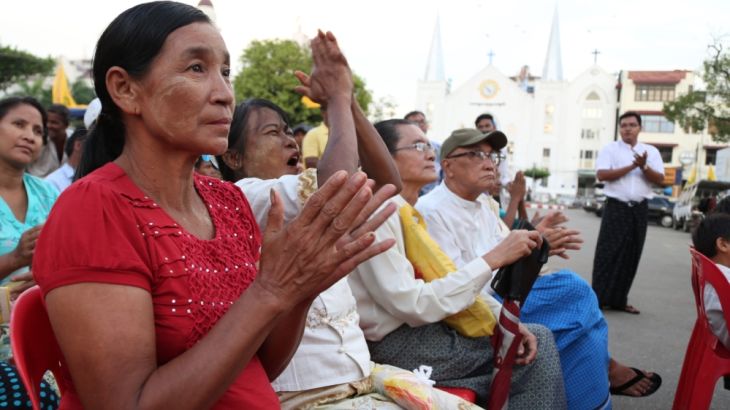Myanmar holds crucial parliamentary election
Excitement high over first openly contested poll as country aims to make transformation from military rule to democracy.

Yangon, Myanmar – Voting is under way in Myanmar’s parliamentary election, the first openly contested poll in 25 years, which could determine if the military-backed ruling party will hold onto power, or lose to the opposition led by pro-democracy campaigner Aung San Suu Kyi.
Amid allegations of voting irregularities, around 30 million voters will cast their ballots on Sunday, and pick from among the 6,065 candidates to fill the two houses of the national parliament and regional assemblies.
Keep reading
list of 4 items‘I won’t serve’: Myanmar people plan exit to escape military draft
Myanmar’s rebels see unity as key to victory over weakened military rulers
Concerns raised over Myanmar’s ailing Aung San Suu Kyi
Many started lining up at booths across Yangon well in advance of polls opening at 6am local time, and it took up to an hour for many to make it through the line and into the voting centres.

“It’s a very important day for Myanmar. It’s a day that people have been waiting decades for,” Phil Robertson, Human Rights Watch deputy director for Asia, told Al Jazeera in Yangon.
He said that while there were no “systematic” voting irregularities, some voters have turned up at the polls only to find out that they are not on the list of voters.
In Shan and Kachin states, there were reports of the military monitoring the voting, he said.
“The concern is not necessarily today, but the days following this, when issues come up connected to electoral disputes, and how these are resolved,” Robertson said.
He said the election commission “may not be fully impartial” as the chairman has already expressed support for the ruling party.
No incidents of violence or unrest were reported across the country.
Suu Kyi was met by a small army of journalists, who pushed for position as she arrived to cast her vote at a polling station in the Bahan township area of Yangon.
![Suu Kyi cast her vote at a polling station in the Bahan township area of Yangon on Sunday [Ted Regencia/Al Jazeera]](/wp-content/uploads/2015/11/9cd0dcab817c4aa2a7cdb254c059ca9f_18.jpeg)
She did not talk to reporters or make any public statements.
Meanwhile, her supporters repeatedly shouted: “Mother Aung San Suu Kyi”.
Earlier, at the same polling booth, Henry Khin Maung, a shipping-boat captain, told Al Jazeera he hoped Suu Kyi would lay the foundation for Myanmar to become an economic powerhouse like Singapore or Malaysia.
The election “is the beginning of a new era”, he said.
Myanmar Votes 2015: Voices from the heartland
After a two-month campaign period, which saw the stripping of the right to vote of an estimated one million Rohingya Muslims, an attack on an opposition candidate, and deadly fighting in rebel-held areas in northern border states, a 24-hour break in campaigning was observed on Saturday before the vote.
|
|
Suu Kyi’s National League for Democracy (NLD) party issued a statement on Sunday, accusing the ruling party of loaning $100 to households with the promise that they do not need to pay it back if USDP wins.
The NLD is trying to wrest control of the lower and upper houses of parliament from the USDP.
A decisive NLD win would give the opposition the right to pick the next president, alongside the military, which retains 25 percent of the total number of parliamentary seats.
While Suu Kyi is barred by the current constitution from becoming president – her children are foreign nationals – an NLD majority would also allow her to manoeuvre politically, paving the way for constitutional amendments, and eventually an appointment to the presidency.
“It is not just a matter of winning the elections, but also forming the government,” she had declared.
![Small national parties and regional ethnic parties could drain some support from the opposition NLD [Ted Regencia/Al Jazeera]](/wp-content/uploads/2015/11/8114a3834abf4198878fdb40ff95ca11_18.jpeg)
Smaller parties, including regional ethnic parties, could also drain support from Suu Kyi’s party.
In 1990, the NLD also swept the parliament, but the result was annulled by the military and Suu Kyi was placed under repeated house arrest until her release in 2010.
![Taxi driver Daw Tin May Tung said she voted for the ruling party, USDP [Ted Regencia/Al Jazeera]](/wp-content/uploads/2015/11/0b4f0e93ecce4700b7a41ebe163504c4_18.jpeg)